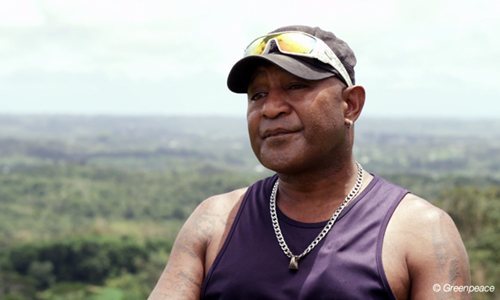

“I feel sorry for my friend. He was thirsty at 1am and there wasn’t any water. So he drank water from the air conditioner.”
[youtube https://youtu.be/79EPIaK5Lhg
expand=1]
“I saw his fingers, they were missing. I asked what happened.”
[youtube https://youtu.be/SBmH8Mw2F9U
expand=1]
“So you’ll have two to three hours sleep then you’ll start again in the morning.”
[youtube https://youtu.be/BiK8Po1-r7A
Targeting Tuna
These brave individuals and others like them are shining a light on the long history of abuse and slavery on tuna fishing vessels. Greenpeace has worked on tuna sustainability issues for years, and it’s becoming increasingly clear that we must all work together to address the deeply ingrained human rights issues within the industry, as well.
Labor abuses and slavery that destroy the lives of workers and their families, and overfishing that destroys ocean life are both issues that stem from an out of control and under regulated industry. Greenpeace and a range of allies across the environmental and human rights movements are working to transform the tuna industry into one that is both just and sustainable.
As consumers, we should all be questioning where our tuna comes from.
In both the recent New York Times investigation and an Associated Press investigation in March, Thai Union—owner of Chicken of the Sea and soon Bumble Bee in the U.S.—was directly implicated for major human rights abuses and slavery at sea. This raises a glaring red flag that the largest tuna producer in the world has undeniable connections to this issue.
These stories—and the thousands of others like them that have gone untold—are a call to action for the tuna industry. Now more than ever, leaders must emerge to show that they take these issues seriously and are committed to addressing them in their global supply chains. There are a variety of solutions that companies and governments can begin implementing today that can address both the human rights abuses that are rampant and sustainability concerns.
Tuna fishing has become destructive for both people and the oceans—and it must be reformed immediately. Tweet at your favorite tuna company to let them know that you want them to proactively implement the solutions that will protect people and our oceans:
- Tweet at Bumble Bee: It’s unacceptable that tuna fishing is linked to human rights abuses. @BumbleBeeFoods, what actions are you taking?
- Tweet at Chicken of the Sea: I’m calling on @COSMermaid to take action on human rights abuses in the tuna industry. You can too.
- Tweet at Starkist: .@StarkistCharlie, are you playing your part to address human rights abuses in the tuna industry? We deserve to know.
YOU MIGHT ALSO LIKE
4 Best Places to Buy Your Seafood
Canned Tuna Shopping Guide: How Does Your Brand Stack Up?
Farmed Salmon Rejected Over Huge Spike in Antibiotic Use Due to Bacterial Outbreak

 233k
233k  41k
41k  Subscribe
Subscribe 